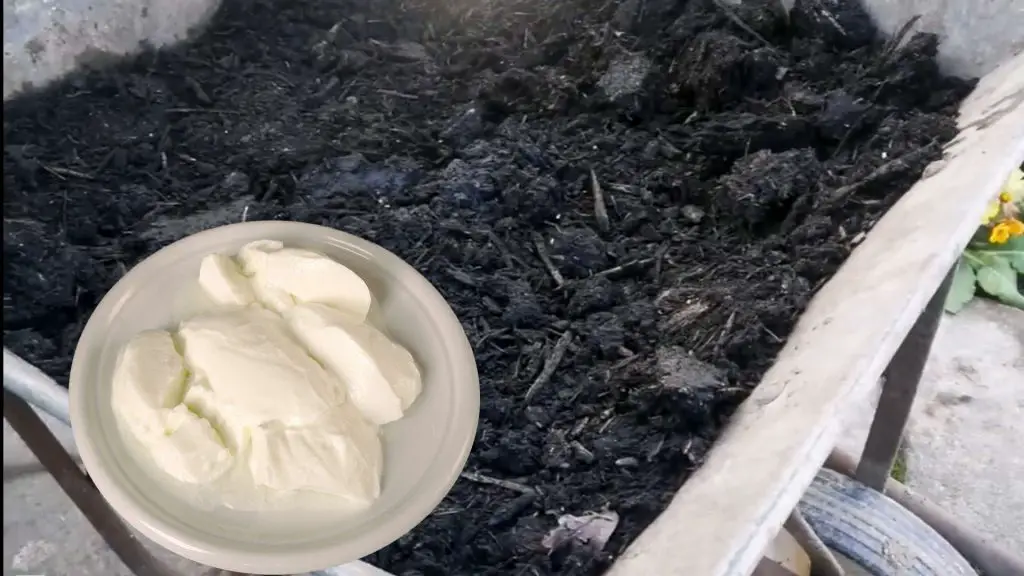Yogurt in Compost | The Do’s and Don’ts of Adding Yogurt to Compost
Yogurt, as with a foodstuff, is considered organic material and can be added to your composting pile. Whether it is a good idea to put yogurt in compost is a different question as there are several reasons why it is not always a good idea to do so.
Can You Put Yogurt in Your Compost?
Yogurt being an organic material can be composted. It is nutrient-rich and full of healthy bacteria which when broken down during the composting process can help to produce compost full of plant-friendly resources to help your garden thrive.
Yogurt as a source of soil microbes?
Being full of bacteria yogurt can play an important role in developing soil microorganisms. These play a vital role in maintaining healthy soils. They break down waste products from plants and animals into nutrients that plants can absorb. In return, they receive energy from the plant roots. If you want to grow a garden, then having access to a supply of high-quality soil is essential. This includes having access to a wide range of bacteria and fungi. Composting is one way to achieve this.
However, composting yogurt is not straightforward for a variety of reasons not least because its composition can make it difficult to break down.
What is the chemical makeup of yogurt?
Yogurt is a fermented milk product. It is made when the bacteria, Lactobacillus bulgaricus, and Streptococcus thermophilus, convert lactose (milk sugar) to lactic acid, which acts on milk protein to give yogurt its texture and its characteristic tart flavor.
The bacteria can also convert milk sugar (lactose) to lactic acid, which acts as the flavoring and preservative agent in yogurt.
Although milk and yogurt contain around 0.5% nitrogen their decomposition can be hindered by their high-fat content. Yogurt contains around 4-5% fat. In terms of composting while protein elements will decompose fast fat decomposes far more slowly. If you add too much yogurt to your composting pile it could slow the decomposition process. [1]
Because of this, some composting methods are better suited to composting yogurt and other dairy products than others.
Reasons not to compost yogurt?

As we have seen yogurt can be composted although the decomposition process can be complex. There are many types of organic material that take several months or even years to break down into finished compost. However, with yogurt, there are two additional problems that need to be considered and may well deter you from composting it.
The first, and probably the most pressing problem, is that, as with other dairy products, yogurt will attract vermin. If you are using a regular cold composting method then this can be a serious problem and the length of time it takes to decompose gives ample time for vermin to be attracted and your composting pile at the very least disrupted or more likely destroyed.
The second problem is that of smell. Composting yogurt gives off a foul smell and even if your composting pile is protected from vermin it can then become an unpleasant job managing and turning the pile.
Ways to safely compost yogurt?
Despite its problems, there are ways in which you can safely get the benefits of composting yogurt without the problems.
Vermin is a very real problem but two things can keep them at bay, heat and a managed environment.
If you are going to compost yogurt then hot composting is the best way to go about it. Hot composting speeds up the stages of composting to produce finished compost in as little as four to five weeks.
Hot composting produces elevated heat levels between 130-150 °F quickly. It does this through the use of a nitrogen-rich pile, around 1:25 carbon to nitrogen ratio (C/N), and regular infusion of oxygen through turning every couple of days and keeping the pile moist.
With such elevated temperatures, vermin will stay away. It is still advisable though to put yogurt into the center of the hot compost pile, adding it as the pile temperature rises.
You can also compost yogurt using a closed compost bin. As little air can get into the bin the process is anaerobic and without oxygen the decomposition process is slow. However, a closet composting bin should prevent vermin from being able to get at the composting material.
If you are going to add yogurt to your compost bin, then it should be done at least once every three months. This will ensure that the bacteria present in the yogurt have enough time to break down the lactose sugars in the product. The longer you wait, the less effective this process becomes.
Fresh vs “gone off” yogurt
One tip is that If you want to add yogurt to your compost, then you will need to ensure that it has gone off before adding it to the pile. This means that you should wait at least two weeks after opening the container, but ideally three months. The longer you leave it, the better the compost will be.
Using yogurt as a fertilizer
There are gardeners who like to add yogurt directly to plants, with many arguing that is particularly good as fertilizer for tomatoes.
If you do add yogurt directly to soil it will break down into nitrogen and potassium if animals leave it alone. These nutrients are needed by plants, but prior to breaking down some bacteria in yogurt could be harmful to the soil and certain plants.
It is therefore probably not the best way to utilize the benefits that composting yogurt can provide. Instead, add it to your hot composting pile to the compost bin and use the finished compost from here that will be full of nutrients and helpful microbes.
If you are going to add yogurt directly to your soil, then it should be done by using a container. Add to the container then cover the top of the container with soil and wait for the mixture to ferment. Once it has fermented, you will need to remove the yogurt from the container and mix it back into the soil.
Notes
[1] Ekram E.B. Mohammad: Chemical Composition and Microbial Load of Set Yoghurt
